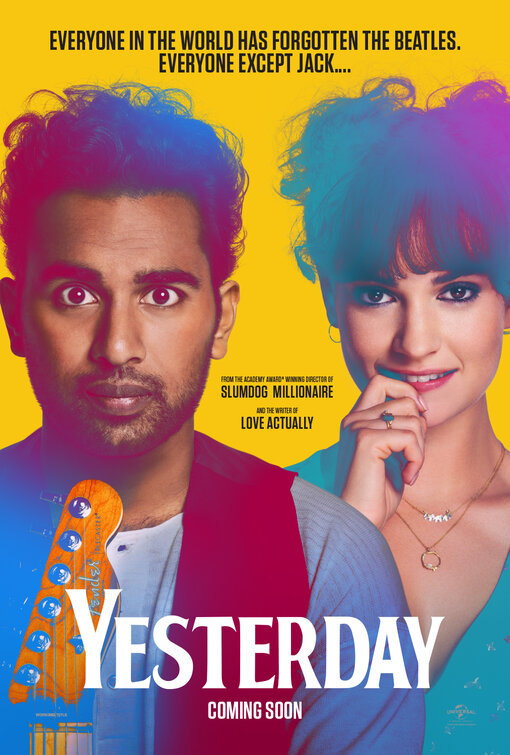Everyone In The World Has Forgotten The Beatles. Everyone Except Jack
Director
Danny Boyle
Starring
Himesh Patel
Lily James
Kate McKinnon
Joel Fry
Ed Sheeran
Jack Malik [Patel] is a struggling musician in the east of England, represented by his manager and childhood friend Ellie [James]. Feeling close to giving up on the music life (or lack thereof), Jack cycles home one night but due to a 12 second global power-cut, is hit by a random bus, losing his two front teeth in the process. As a get-well present, his friends buy him a new guitar and he christens it by playing Yesterday by The Beatles. For some reason, nobody recognises the song, attributing it to Jack. In a panic, Jack learns that this seems to be a worldwide phenomenon and takes it upon himself to gift the world with the songs. After initially struggling, “Jack’s music” is heard around the world and attracts the attention of Ed Sheeran and his unscrupulous producer, Debra Hammer [McKinnon].
There will be a recurring theme throughout this review and unfortunately, it is targeted at one individual in particular; perhaps unfairly, perhaps not. In my opinion, Danny Boyle doesn’t make bad films but Richard Curtis makes plenty of trite ones. To clarify, I have enjoyed a lot of Curtis’ work and he is very deft at producing a certain type of writing but it’s all notoriously twee, rudimentary and rather corny. As such, we probably need to start by talking about the writing and the characters.
Both Himesh Patel and Lily James are, for lack of a better word, very cute. There’s a wonderful relatable earnestness to their performances and this really helps drive the story along, regardless of the absurdity of its foundation. I feel that Boyle has an eye for this and was reminded of Millions, which has a quirky fairy tale device but it is never questioned because the cast are so wholesome and engaging. This unfortunately also means that despite best efforts, the supports are pretty forgettable. That is, until we get to the halfway point of the film and hyperbole reigns over logic. Childhood friend Rocky quickly devolves into a clone of Rhys Ifans’ character from Notting Hill and Kate McKinnon departs the typical agenda-driven producer tropes and becomes a wide-eyed, money obsessed, maniacal figure and everything breaks down into farce. While Patel makes it through in reasonable shape, James’ character is utterly butchered. Without wanting to spoil too much, Jack bumps into Ellie in Liverpool, where she issues an ultimatum: continue on his journey to fame and success or stay with her. This is, frankly, some very lazy writing and creates a path riddled with clichés that the film haphazardly falls into. I appreciate you can’t have drama without conflict but forced in this way, at this time in the story, is quite amateur and sullies both the character and the unrequited nature of the relationship. As stated, James’ charm saves a lot of this because it’s not badly acted but badly drawn selfishness. While this on its own may sound like I am being unfair toward the role of Ellie, it’s a by-product of inconsistencies, whereby she loves Jack dearly but only mentions it at the worst times (setting Jack up to be ineffective and never actually address the issue), is fully supportive until the sought-after success arrives and contradicts her own advice when Jack is thinking of quitting and she explains that he can’t go back to teaching and pour all his energy into kids who will succeed where he deserves to – that last one is a particularly weird line that, due to being delivered well we nod along with in the moment, but in retrospect feels rather cruel and dismissive. Again, I believe the relationship and the chemistry between the two leads is solid but everything they say and do with each other feels clumsy and stupid. But I also appreciate the same could be said of almost every character that Curtis has written and people love them – so maybe it’s a personal rather than purely critical frustration (it isn’t).
The unspoken additional character is this newly forged world that Jack finds himself in. Subsequently there is some truly odd world-building. The trailers hide quite well that a world without The Beatles means there is no Oasis (as they were largely inspired by the Beatles’ sound and aesthetic) which was a nice, surprising touch. This quickly gets out of hand, however, when that extends to Coca Cola, cigarettes and Harry Potter; not to mention Saturday Night Live is now Thursday Night Live for unspecified reasons. Considering how many creatives have been quoted as saying “I wouldn’t be a musician/actor/writer without the Beatles,” hyperbolic or not, the choices illustrated here are very unusual. Things like no Monty Python or Led Zeppelin would have made more sense rather than just a few random alterations. Amazon Prime’s The Man In The High Castle TV series is an interesting “what if” story (what if the Allies lost World War II?) that doesn’t get overly muddied by complicating the rules of its existence. It establishes the similarities and revels in the eccentricities and nuanced differences of this new world. Unfortunately Yesterday seems to operate without any real rules. While I cannot confirm this, it would seem Jack Barth’s initial script has been injected with Curtis-isms and punched up to something more familiar and marketable. I prattled on about this before but there were so many random subtractions, done on a whim, free from research. Apparently, at one stage Curtis wanted to remove the colour purple – the literal colour – from existence. No logical basis for this, just because it would be weird.
**spoilers for the end of the film throughout**
The other key problem I have with this film is how it ends. I am of the opinion that it essentially crumples under the weight of a very rushed, odd, incredibly (almost insultingly) simplistic finale. Making a surprise appearance at one of Ed Sheeran’s stadium concerts, Jack confesses that he is not the progenitor of the songs and credits John, Paul, George and Ringo, to expected animosity and a sea of jeering. He then changes it up by confessing his love for Ellie (who is now in a relationship) and then defies his producer by uploading his entire catalogue to the internet. I hate this plot point. Nothing screams “old man who doesn’t understand how the internet works” better than hacking something or “I will upload it to the internet.” For all the evils of corporations and the excess of fame, I don’t think you can just upload music to the internet and escape the tangled madness of royalties and contractual obligations. But this is what happens. Even then I was expecting the film to turn. It was only a matter of time before normality would be restored and it would be revealed that Jack had in fact been in a coma or was having some manic fever dream but this never comes to pass. This alternate universe is now the new reality. While this allows for a seemingly neat ending, it gave me a complete headache. As I left the screening, many of the audience members muttered to each other “ooh I really enjoyed that” but all I could think of was the logistics and fallout. At one point it is stated that a world without The Beatles is poorer for it and as a fan of their work, I would agree but while I love The Beatles, a world without cigarettes and the Manson murders is surely a better place. It’s the kind of innocent naïve writing that permeates blockbuster cinema where we suspend a level of disbelief and analytical detail to simply enjoy the mirth and hijinks but this kind of surreal, lacklustre close ends up anticlimactic and beneath those involved.
Finally, I need to step away from the writing and talk about the music. Almost half of this film’s budget went on royalties to use The Beatles’ tracks and their presence is a joyous celebration of what makes them popular and iconic. In these kinds of films, the score can be relegated to the background but I genuinely feel Daniel Pemberton’s score complimented the songs marvellously, utilising familiar stings and leitmotifs while accenting the on-screen drama. But getting back to the songs themselves – as a celebration of The Beatles’ hits, I felt like Across The Universe was a more lovingly crafted piece that, due to its musical nature, did more with the pieces and various reference points throughout. Having said that, if the purpose of this release was to instil a feeling of nostalgia or triumph for these iconic anthems, it would be fair to say this was achieved magnificently.
Ultimately this is an interesting premise let down by writing that could not do the concept justice. There’s plenty of whimsy, mirth and charm on display but overall it’s a very disappointing and surprisingly shallow tale.
Release Date:
28 June 2019
The Scene To Look Out For:
There’s a touching moment that all creatives must feel, when Jack, who has been playing (arguably) some of the greatest songs of all time to pub audiences who do not appreciate what they’re hearing. This then raises some extremely interesting questions about the concept of talent over luck and opportunity, depicting literal imposter syndrome; that the material is good but it must be the delivery method (i.e. him) that is the problem when in truth, it’s audience absorption of art and the money-making system that drives it. It’s genuinely fascinating and I just wish it was developed a little more.
Notable Characters:
**spoilers**
Don’t ask me why – because the film never bothers to explain it. But Jack is the only person who remembers the Beatles. Except he isn’t. For some unknown and bizarre reason, there are two other individuals; a Russian named Leo and a Liverpudlian named Liz – played by Justin Edwards and Sarah Lancashire respectively. Toward the end of the film, these two meet up with Jack but rather than expose him, they thank him for bringing the music back into the world to hear it again and supply him with the address for a still-living John Lennon. At the point of writing this, I’m still not sure how I feel about these two characters. They are setup like creepy stalkers for so long that the twist doesn’t pay off in the intended manner and it seems they are solely there to allow the central figure a chance to vent and revel in the abnormal situation that they’ve found themselves in. But again, none of them question it and everything just carries on as normal.
Highlighted Quote:
“You’ve gotta stop pretending you’re in a big story with an exciting end. You’re in a small story and it ends here”
In A Few Words:
“A strange silly fantasy tribute that, in the words of my wife, I loved until suddenly I didn’t”
Total Score: 2/5
![The Red Right Hand Movie Reviews [Matthew Stogdon]](https://reviews.theredrighthand.co.uk/wp-content/uploads/2021/12/cropped-header1.png)




